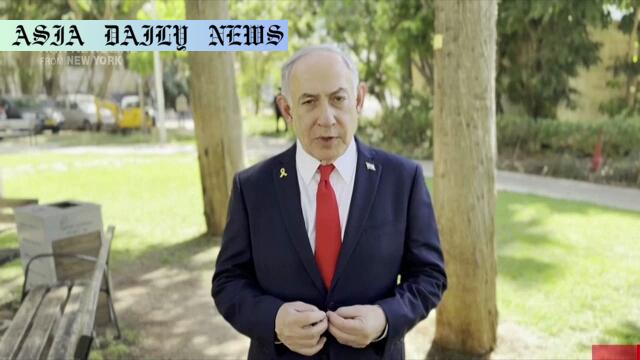Syria remains volatile after Israeli strikes targeting military positions in Damascus highlight tensions and Druze protection concerns.

Netanyahu’s Warning: Understanding the Critical Red Lines
Israeli Prime Minister Benjamin Netanyahu recently issued a grave warning against Syrian leaders for crossing what he termed his ‘red lines.’ These red lines pertain to the demilitarization of the southern region of Damascus and the protection of the local Druze community in Syria. Netanyahu stated, “Demilitarization of the region south of Damascus, from the Golan Heights and to the Druze Mountain area, is rule number one. Rule number two is protecting the brothers of our brothers—the Druze at the Druze Mountain.” This statement underscores Israel’s proactive stance in maintaining dominance and its strategy to ensure regional safety through decisive military action.
The Context Behind the Conflict
Israel’s strong response came immediately after its military launched a series of airstrikes targeting Syrian military positions in Damascus. These strikes were officially aimed at stopping the movement of Syrian troops and protecting the Druze minority, who have long been considered ‘brothers’ by Israel. However, these efforts have sparked sharp criticism from Syria’s interim President Ahmed al-Sharaa, who accused Israel of using the Druze issue as a pretext for its intentions to fracture Syria further. Sectarian violence in the city of Sweida over the last weekend added fuel to the fire, complicating dynamics between local Bedouin tribes and the Druze religious community. Heavy clashes drew in interim Syrian governmental forces, who later became additional targets of Israeli airstrikes.
Sensitive Geopolitical Strategies: Syria and Israel
Geopolitically, southern Syria remains a highly sensitive region for both Israel and Syria. The Golan Heights, long contested since being seized by Israel in 1967, sits adjacent to militant-heavy zones. Netanyahu appears to be implementing buffer-zone strategies, seemingly unilateral and militarized, to secure Israel’s border. As highlighted by Middle East expert Suzuki Hiroyuki from the University of Tokyo, these zones help Israel prevent movements of both armed militias and governmental troops. However, they also risk aggravating Syria’s fragile sovereignty, intensifying accusations of overreach. Evidence from UK-based Syrian Observatory of advancing Israeli forces into Druze towns sheds light on how fluid this situation has become, hinting at ‘rare developments’ that could escalate beyond control.
Multiple Stakeholders in a Volatile Conflict
Netanyahu’s assertive stance underscores a significant turning point in the Israeli-Syrian conflict, but its broader implications cannot be ignored. Israel’s protective measures for the Druze act as double-edged swords. While upholding humanitarian grounds, it simultaneously invites backlash from Syria and its allies, urging claims of political motivations rather than moral obligations. Israel’s substantial military operations in a fragmented Syrian landscape reveal profound risks, particularly since the interim government struggles to centralize control after years of civil war. Iran, Russia, and other powers maintain active military roles within Syria, adding another layer of complexity to an already volatile environment.
Looking Ahead: Prospects for Stability
The involvement of multiple power players in Syria leaves its fate precarious, tilting on a razor’s edge between turbulent conflict and potential peace negotiations. Netanyahu, despite affirming his dedication to Israel’s national security, effectively deepens the divide in regional stability. Meanwhile, the Druze people face the brunt of this turmoil, sandwiched in tensions over identity and territorial control. Conversations, whether brokered by international coalitions or through diplomatic measures, will be crucial to stabilizing outcomes over a lasting time frame. Yet, the larger quest remains: can humanitarian aid and diplomacy surpass militaristic interventions to provide sustainable peace in this ongoing conflict?
Commentary
Netanyahu’s Strategy: Prudence or Political Posturing?
Prime Minister Netanyahu’s declaration illustrates a fine balance between defending national sovereignty and intervening strategically in a neighbor’s conflict. His promises to enforce ‘red lines’ underline a policy designed to consolidate influence while protecting minorities such as the Druze, whom Israel has historically supported. While framed as a humane effort, it inevitably raises questions about the underlying intentions and how Israel’s actions could reshape the already fractured Syrian landscape. Is this a concerted effort to stabilize chaotic regions near Israel, or merely an opportunity to assert dominance?
A Tense Power Play: Risking Long-Term Fallout
The geopolitical stakes in Syria have never been higher. Syrian leadership accuses Israel of using the Druze to mask far-reaching political motives, suggesting ulterior motives underlie these recent airstrikes. Are the moves truly humanitarian, or part of a larger strategy of regional leverage? No doubt, Netanyahu’s aggressive policies could secure immediate results, such as halting militia advancements. But it risks alienating communities, further destabilizing Syria, and increasing anti-Israel sentiment within the Arab world. These unintended consequences must be weighed considerably as Israel charts its future approach.
The Need for International Diplomacy
As regional tensions escalate, the need for diplomatic negotiations becomes more apparent. Global leadership, spearheaded by initiatives from the UN or influential countries, could facilitate balanced ground rules that ensure minority protection without aggravating cross-border conflicts. Netanyahu’s unilateral declarations and Syria’s impassioned rebuttals will only lead to broader rifts if left unchecked. Comprehensive dialogue is a missing puzzle piece, yet vital for bridging divides while safeguarding the Druze and mitigating escalating violence.


